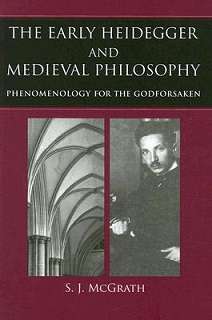The Early Heidegger and Medieval Philosophy
The Early Heidegger and Medieval Philosophy: Phenomenology for the Godforsaken is a 2006 book by Sean J. McGrath, in which the author critiques secularization through examining the relationship between Martin Heidegger's thought and late medieval and early Protestant Christianity.
 | |
| Author | Sean J. McGrath |
|---|---|
| Subject | Heidegger's philosophy |
| Published | 2006, reprinted 2013 |
| Publisher | Catholic University of America Press |
| Pages | 288 pp. |
| ISBN | 9780813221878 |
Synopsis
Struck by the analogies between the thought of the early Heidegger and late medieval and early Protestant Christianity, McGrath discovered that the similarities were far from accidental. Through careful archival work in Germany, McGrath argued (with Max Scheler and Jacques Derrida), that Heidegger, an ex-seminarian and formerly devout Catholic, had secularized Christian concepts in Being and Time. Heidegger's book went on to become a foundational text in 20th century atheist thought, and yet none of its major themes would be possible, according to McGrath, without Christianity.
Reception
The book has been reviewed by Philipp Rosemann, James D. Reid, Christian Lotz and Michael L. Raposa.[1][2][3][4] On the strength of this work, the Centre for Theology and Philosophy at the University of Nottingham, the theological think-tank headed by the Anglican theologian John Milbank, commissioned McGrath to write a short critique of Heidegger for theologians.[5]
References
- Raposa, Michael L. (2007). "The Early Heidegger and Medieval Philosophy: Phenomenology for the Godforsaken by S. J. McGrath (review)". The Thomist: A Speculative Quarterly Review. 71 (4): 646–649. doi:10.1353/tho.2007.0007. ISSN 2473-3725. Retrieved 30 September 2018.
- Lotz, Christian (2007). "The Early Heidegger and Medieval Philosophy: Phenomenology for the Godforsaken". The Medieval Review. 9. Retrieved 30 September 2018.
- Reid, James D. (13 November 2007). "The Early Heidegger and Medieval Philosophy: Phenomenology for the Godforsaken (review)". Journal of the History of Philosophy. 45 (4): 673–674. doi:10.1353/hph.2007.0094. ISSN 1538-4586. Retrieved 30 September 2018.
- Rosemann, Philipp (2007). "The Lutheran Heidegger: Reflections on S. J. McGrath, The Early Heidegger and Medieval Philosophy," Philotheos: International Journal for Philosophy and Theology". Philotheos: International Journal for Philosophy and Theology. 7: 327–32. Retrieved 30 September 2018.
- "Department of Philosophy". Memorial University of Newfoundland. Retrieved 30 September 2018.